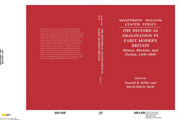Book contents
- Frontmatter
- Contents
- Preface
- WOODROW WILSON CENTER SERIES
- 1 Introduction
- 2 Precept, example, and truth: Degory Wheare and the ars historica
- 3 Truth, lies, and fiction in sixteenth-century Protestant historiography
- 4 Thomas More and the English Renaissance: History and fiction in Utopia
- 5 Little Crosby and the horizons of early modern historical culture
- 6 Murder in Faversham: Holinshed's impertinent history
- 7 Foul, his wife, the mayor, and Foul's mare: The power of anecdote in Tudor historiography
- 8 Experience, truth, and natural history in early English gardening books
- 9 Thomas Hobbes's Machiavellian moments
- 10 The background of Hobbes's Behemoth
- 11 Leviathan, mythic history, and national historiography
- 12 Protesting fiction, constructing history
- 13 Adam Smith and the history of private life: Social and sentimental narratives in eighteenth-century historiography
- 14 Contemplative heroes and Gibbon's historical imagination
- Contributors
- Index
- Titles in the series
1 - Introduction
Published online by Cambridge University Press: 04 August 2010
- Frontmatter
- Contents
- Preface
- WOODROW WILSON CENTER SERIES
- 1 Introduction
- 2 Precept, example, and truth: Degory Wheare and the ars historica
- 3 Truth, lies, and fiction in sixteenth-century Protestant historiography
- 4 Thomas More and the English Renaissance: History and fiction in Utopia
- 5 Little Crosby and the horizons of early modern historical culture
- 6 Murder in Faversham: Holinshed's impertinent history
- 7 Foul, his wife, the mayor, and Foul's mare: The power of anecdote in Tudor historiography
- 8 Experience, truth, and natural history in early English gardening books
- 9 Thomas Hobbes's Machiavellian moments
- 10 The background of Hobbes's Behemoth
- 11 Leviathan, mythic history, and national historiography
- 12 Protesting fiction, constructing history
- 13 Adam Smith and the history of private life: Social and sentimental narratives in eighteenth-century historiography
- 14 Contemplative heroes and Gibbon's historical imagination
- Contributors
- Index
- Titles in the series
Summary
There is a history in all men's lives,
Figuring the nature of the times deceas'd.
– Henry IV, Part 2, 1.1.80–81… imagination bodies forth
The forms of things unknown.…
– A Midsummer Night's Dream, 5.1.14–15“History” and “story” are derived from the same root, and they have converged again in modern times, especially through the recognition of their common dependence on imagination. Both history and literature are forms of cultural memory, and in this respect, too, they have a link with imagination. Historians pretend to recapture the past in all its fullness, but in fact they are bound by the limits and conventions of narrative prose. Nor can literary artists, even the most “classic” among them, remain free of the toils of history; for as Shelley admitted, “this is an influence which neither the meanest scribbler nor the sublimest genius of any era can escape.”
Since antiquity the ars historica and the ars poetica were sister genres, with overlapping issues and similar values. From the time of Cicero and Quintilian the art of history has made claims on truth, but like poetry, it has also aimed at beauty, or pleasure (voluptas), and goodness, or utility (utilitas). In more recent times, too, the realization of such a common pedigree and such common purposes has reinforced the ties between historians and literary scholars and opened further what has been called “the open boundary of history and fiction.” As historians have come to recognize the aesthetic dimension of their craft and the necessity to resort to imagination to fill in gaps in the narrative, so literary scholars are acknowledging the historicity of literature, its value as a reflection of bygone worlds not recoverable through conventional documents, and the use of literary criticism for the interpretation of such documentation.
- Type
- Chapter
- Information
- The Historical Imagination in Early Modern BritainHistory, Rhetoric, and Fiction, 1500–1800, pp. 1 - 10Publisher: Cambridge University PressPrint publication year: 1997
- 3
- Cited by

